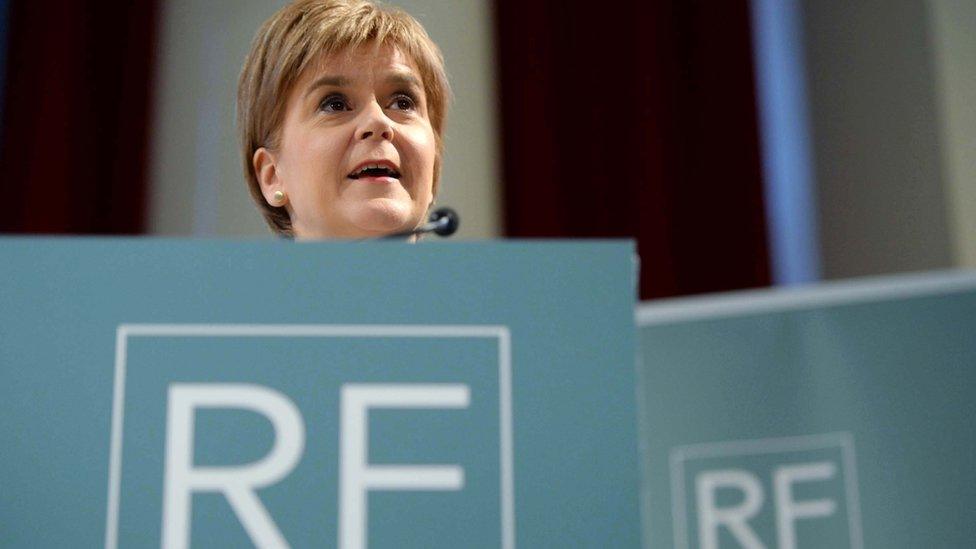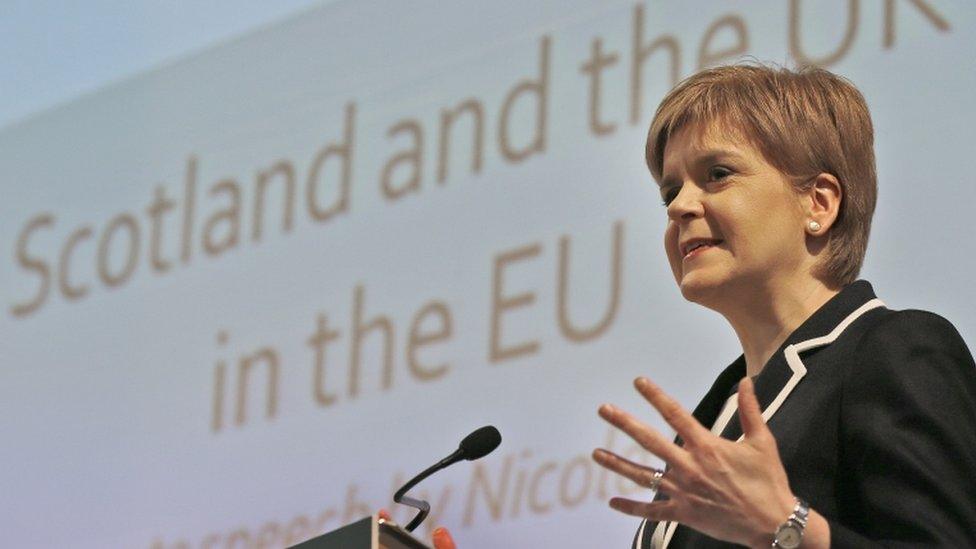EU referendum: Does Brexit - Scotland = indyref2?
- Published

Nicola Sturgeon made a keynote speech on Europe in London
An intriguing argument advanced today by Nicola Sturgeon anent membership of the EU. Ms Sturgeon opened, for the avoidance of doubt, with a first principle.
She confirmed to her London audience that she remained an advocate of Scottish independence. She repeated, further, that Brexit without Scottish consent might well lead to pressure for a second independence referendum.
And so we have a constructed syllogism. Brexit - Scotland = indyref2. Hence, Ms Sturgeon is of course a supporter of Brexit? QED? Right? Fundamentally wrong?
Indeed, Mr Sturgeon went so far as to say: "I do want Scotland to be independent but I don't want Scotland to become independent because the UK chooses to leave the European Union."
Does that mean she is firmly rejecting a possible path to independence? It can sound that way but I believe the reality is rather different. In effect, Ms Sturgeon is implying that using Brexit as a route to independence would not work and would be counter-productive.
Firstly, as noted previously, the SNP has been pro-EU for decades. It has been a core prop of the independence case: that people in Scotland would not be "leaving" the UK, that they would instead be joining the EU on equal terms with rUK.
Not quitting, but joining, to paraphrase Stevie Smith. Folk tend to be companionable. They prefer joining to quitting. They prefer inclusion to exclusion, if circumstances are equal.
In addition to that, the SNP case has been largely based upon the opportunities available to an independent Scotland to build upon international links, not least with the EU.
It would be a huge leap for Ms Sturgeon to abandon such support - without a countervailing argument. Such an argument is difficult to discern.
What is the SNP's case for Europe?
Secondly and more basically, Ms Sturgeon is seeking to posit stability, to posit certainty - or as much as is feasible in a troubled world.
Remember always that the case for Scottish independence is founded upon confidence, not fear. Upon an argument that Scotland could thrive, not primarily a claim that Scotland is subjugated - although, of course, such a claim features largely in the demotic debate.
Nicola Sturgeon says the EU delivers economic, social and environmental benefits for Scotland and the UK
By comparison with many other national movements globally, the SNP case is, in short, about self-belief, not flight from proclaimed despotism.
By definition, Brexit - with or without Scottish consent - would involve considerable disruption, considerable uncertainty. Advocates of departure say this would be transient and well worth the gain. Opponents dissent.
Ms Sturgeon is a declared opponent. In her speech today, she deliberately cited Scotland's immediate neighbours in arguing, on a principled basis, for EU membership. It was good for the current EU, it was good for Ireland - and for a potential future independent Scotland but also for rUK.
It was a good thing. Something to be advanced. In essence, this is an argument for continuing stability, pending a further pitch for independence which might be some years off: for minimising any sense of upset among the electors.
Importantly, Ms Sturgeon accompanies this fundamental argument with a plea for a "positive" campaign, rather than scare-mongering.
Too bureaucratic
She notes that there was a degree of scare-mongering - or, as she puts it, a "miserable, negative, fear-based campaign" during the Scottish independence referendum.
According to Ms Sturgeon, this cost the No side 20 points in support. Aye, but they still won - and there is some evidence that fostering apprehension over issues such as pensions had an effect.
Further, this referendum is different. I believe that there is fairly widespread discontent with the EU project. Relatively few are passionate, unalloyed advocates. More are scunnered, to a degree. Others are unsure, uninformed.
A positive case might work upon those who are unsure or uninformed. They might have their eyes opened to the benefits of EU membership. Might.
But it will be more difficult to reach those who fear that the EU project is a bureaucratic imposition. That may or may not be a well-grounded complaint. But, once folk think about the issue at all, it may be fairly pervasive.
For such voters - unhappy, unimpressed - a positive campaign may work. But some campaigners may also feel that it will be important to stress the proclaimed disadvantages of departure - the economy, global security. To play, in short, on fear.
On the other side, there will similarly be a "positive" pitch, extolling the virtues of UK sovereignty. But, equally, there will be a reliance upon fear tactics: there will be talk of unchecked immigration.
On both sides, I expect that Project Fear - new style - will have its adherents.

PS: Even as an election and a referendum loom, there is still room in my thoughts for matters footballing. I cannot let this blog go by without mentioning that magnificent result by the mighty United at the weekend. Great goals, great performance, above all great spirit. More please.
- Published29 February 2016
